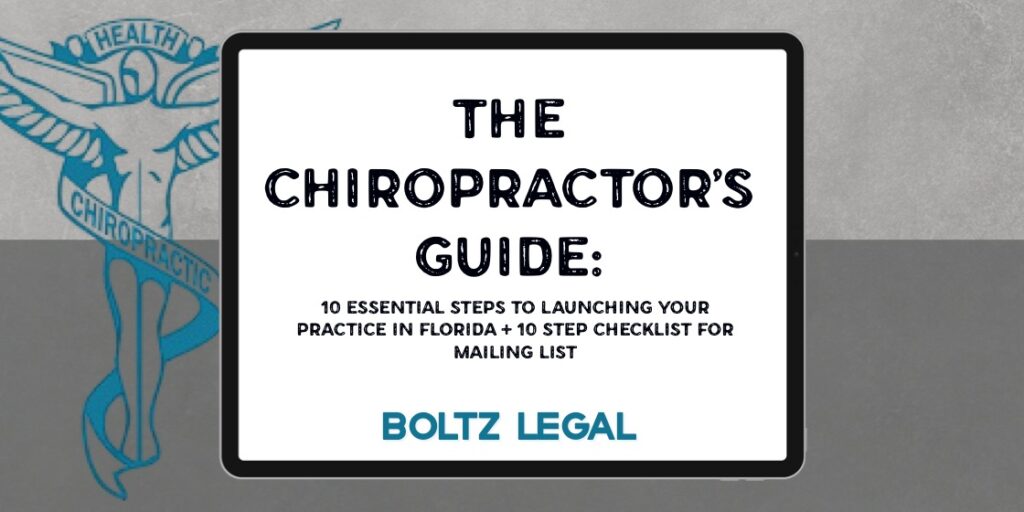(and Why Having a Legal Partner Can Make All the Difference)
Opening your own chiropractic practice in Florida is more than a career move — it’s a statement of independence, professionalism, and service to your community. You’ve worked tirelessly to earn your degree and pass your boards. Now comes the rewarding challenge: building a successful, compliant, and sustainable business.
But starting a chiropractic practice isn’t just about adjusting spines — it’s about navigating state laws, business licenses, contracts, and compliance. The smallest legal misstep can delay your opening or expose you to costly liability before you even welcome your first patient.
This guide walks you through 10 essential steps every chiropractor in Florida needs to follow to launch safely and successfully — plus the key legal insights to protect your investment.
Step 1: Secure Your Chiropractic License
Everything begins with your professional license. In Florida, chiropractors are regulated by the Florida Board of Chiropractic Medicine under the Department of Health.
You’ll need to:
- Graduate from an accredited chiropractic program.
- Pass the National Board of Chiropractic Examiners (NBCE) exams.
- Submit your Florida application and licensing fees.
⚠️ Tip: Start this process early — approval times can stretch for weeks, and missing paperwork is a common delay.
Step 2: Choose Your Business Structure
Your business structure affects how you’re taxed, your personal liability, and how your practice can grow.
Common options include:
- Sole Proprietorship: Fast and inexpensive, but offers no liability protection.
- LLC (Limited Liability Company): The most popular choice for Florida chiropractors because it separates personal and business assets.
- Professional Association (PA) or Corporation (PC): Ideal for multi-provider practices or growth-minded professionals.
You can explore and register through Sunbiz.org – Florida Division of Corporations.
💼 Legal Insight: At Boltz Legal, we often help chiropractors form LLCs or PAs with custom operating agreements that outline ownership, management, and future expansion terms.
Step 3: Register Your Business
After choosing your entity, you’ll need to register your business with the state.
You can do this directly through Sunbiz by filing Articles of Organization (for LLCs) or Articles of Incorporation (for PAs or PCs).
This step makes your practice official and ensures your business name is legally protected.
Step 4: Obtain an EIN
Before opening a business bank account or hiring employees, you’ll need an Employer Identification Number (EIN) from the IRS.
You can apply for free through the IRS EIN Assistant.
Your EIN will be required for:
- Filing taxes.
- Setting up payroll.
- Applying for insurance and business loans.
Step 5: Find and Prepare Your Office Space
Location matters — not only for attracting patients but also for meeting legal and zoning requirements.
Before signing a lease:
- Confirm your space is zoned for healthcare operations.
- Review the lease with an attorney for hidden fees or restrictive clauses.
- Ensure ADA accessibility and safety compliance.
💬 Boltz Legal Tip: We’ve reviewed leases where chiropractors were locked into five-year agreements with no early exit options. A 15-minute legal review can save you thousands.
Step 6: Secure Insurance Coverage
Insurance is your first line of defense. In Florida, most chiropractic practices need:
- Malpractice Insurance: Protects against claims of professional negligence.
- General Liability Insurance: Covers on-site injuries like slip-and-fall accidents.
- Workers’ Compensation: Required if you have employees.
Your policy limits should reflect your practice’s size and patient volume. Partner with an insurance provider familiar with Florida’s healthcare market.
If you ever face challenges with a denied insurance claim or bad faith delay, review our guide Florida’s DOAH Arbitration Disaster: How Citizens Is Stripping Policyholders of Their Rights to understand how insurers can restrict your rights — and how to respond.
Step 7: Create Legally Sound Patient Forms
Patient documentation is one of your strongest legal shields. Every chiropractic office should have:
- HIPAA-Compliant Privacy Forms (see HIPAA.gov).
- Informed Consent and Treatment Agreements.
- Financial and Billing Policies to prevent disputes.
Many chiropractors rely on templates, but these often fail to meet Florida’s specific legal standards. Having a lawyer draft or review your forms ensures you’re covered if a patient challenges treatment or billing practices.
To see how documentation and accountability can affect professionals, read about the Edgewater Officer Fired After Arresting CVS Employee Waiting for Lyft — a case that underscores the importance of proper procedure and legal awareness.
Step 8: Build a Billing and Compliance System
Billing errors are among the top reasons chiropractors face audits and penalties.
To avoid issues:
- Learn proper CPT codes for chiropractic adjustments.
- Maintain accurate documentation for every visit.
- Conduct internal audits regularly.
- Understand the reimbursement requirements of each insurer you work with.
⚠️ Legal Note: Even innocent coding mistakes can trigger an investigation by state or federal authorities. Compliance should be built into your daily routine — not added as an afterthought.
See how attorney diligence and duty apply across industries in Kaster Lynch Farrar & Ball, LLP v. Clyde & Co., U.S., LLP: Charging Liens and the Duty to Protect Legal Fees — a reminder of why clear legal structure and documentation protect your livelihood.
Step 9: Develop Your Marketing and Online Presence
You could be the best chiropractor in Florida, but if patients can’t find you, your business will struggle.
Here’s where to start:
- Claim and optimize your Google Business Profile.
- Use targeted keywords like “chiropractor in Orlando” or “family chiropractic care Tampa.”
- Keep your NAP (name, address, phone) consistent across directories.
- Build partnerships with primary care physicians, local gyms, and physical therapists.
⚠️ Caution: The Florida Board of Chiropractic Medicine regulates advertising for chiropractors. Claims about treatments, testimonials, or patient outcomes must follow strict guidelines to avoid disciplinary action.
Step 10: Hire Staff and Draft Solid Contracts
When you start hiring, you become an employer — and that means more legal responsibilities.
- Draft employment contracts that clearly define pay, hours, and expectations.
- Follow Florida labor laws on overtime and breaks.
- Train staff on HIPAA privacy compliance and patient interaction standards.
Even the best teams can face conflict. Having clear, written policies helps prevent misunderstandings and protects both you and your staff.
For an example of how disputes and lawsuits can affect operations, see The Impact of Lawsuits on Florida’s Insurance Claims — a powerful insight into the ripple effects of litigation on businesses and professionals alike.
Why Legal Guidance Matters from Day One
Every one of these steps involves laws that can be misinterpreted or overlooked. At Boltz Legal, we help chiropractors navigate the legal side of starting a practice — so you can focus on patient care instead of paperwork.
We assist with:
- Drafting and reviewing business contracts.
- Lease negotiations and landlord disputes.
- Insurance claim guidance and coverage issues.
- Employment contracts and staff training policies.
- Patient consent and compliance documentation.
Building a practice is exciting — but it’s also a serious investment. Our goal is to protect that investment from the start.
Bonus Resource: Florida Chiropractor’s Launch Checklist (Coming Soon)
We’re putting the finishing touches on a comprehensive Florida Chiropractor’s Launch Checklist, a free resource that turns this guide into a practical, step-by-step tool you can print and use.
👉 Sign up for updates or contact Boltz Legal today, and we’ll send you the checklist as soon as it’s ready.
Until then, consider this article your roadmap — every step, every form, every legal safeguard you need to build your practice confidently.
Final Thought
“Success is where preparation and opportunity meet.”
— Bobby Unser
Your chiropractic career is built on trust, care, and healing. At Boltz Legal, we’re here to ensure your practice rests on the same solid foundation — legally sound, protected, and ready to grow.
📞 Contact Boltz Legal today to learn how we can help launch and protect your chiropractic practice in Florida.

